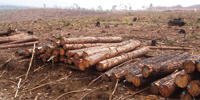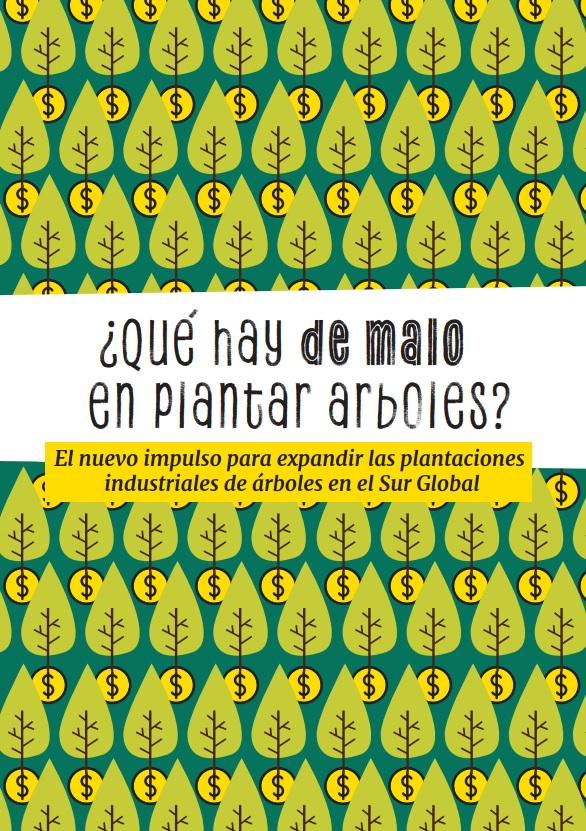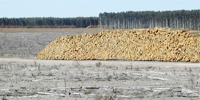PARAR LA FORESTACIÓN
SUS IMPACTOS
CONOCIENDO EL MONTE
RECOMENDAMOS
DESTACAMOS
Info in English
ARTE Y RESISTENCIA
Recibir informacíón
BIBLIOGRAFÍA
SUS AMENAZAS
DESTACAMOS
NORMAS LEGALES
POR QUÉ LA OPOSICIÓN
EMPRESAS en URUGUAY
DESTACAMOS
INFORMACIÓN COMPLEMENTARIA
ENLACES
articles
Uruguay: FSC certification greenwashes monoculture tree plantations
Two large national plantation companies (FYMNSA and COFUSA), a Finnish company (Botnia-UPM/Kymmene) and a Spanish company (Ence-Eufores), have received the Forest Stewardship Council (FSC) certificate. This certificate enables the companies to assure that their “forests” (of pine and eucalyptus!) are managed in an environmentally responsible, socially beneficial and economically viable manner. At least this is […]
Uruguay: Pulp mills and citizen participation – the World Bank in the limelight
A member of the Bretton Woods family since its creation in 1944 together with the International Monetary Fund (IMF), the World Bank continues to be one of the main actors in drawing up and applying macro-economic policies in Southern countries, financing public and private companies in what it qualifies as “development” projects (ranging from the […]
Uruguay: The pulp mill companies’ falsehoods
The traditional January summer siesta in Uruguay has been interrupted, not only by constant rainfall but also because there has been no respite in the advance of the pulp mills. They continue with their advertising campaign, based on falsehoods, which are then repeated as truths. Promises and mirages made to a population with a high […]
Uruguay: World Bank Ombudsman confirms pulp mill risks
The project for the installation of two pulp-mills in Uruguay on the river of the same name, has given rise to firm opposition, both in the country and among civil society in the neighbouring Argentine province of Entre Rios, across the river a few kilometres from the location where the pulp mills are to be […]
Pulp friction
Multinational timber companies are bringing jobs to Uruguay, but some people are concerned about the environmental consequences – by Oliver Balch, The Guardian UK. Wednesday August 17, 2005. Read it here
Uruguay: Campaign against IFC funding of pulp mill projects
Uruguay is in the sights of the pulp industry. The Finnish multinational company, Metsa Botnia and the Spanish company Ence are proposing to install two pulp mills to produce bleached eucalyptus pulp (using ECF process with chlorine dioxide) for export, with Botnia producing a maximum volume of 1 million tons per year and Ence 500,000 […]
Uruguay-Argentina: A huge demonstration against pulp mills
Uruguay, a territory blessed by a profuse hydrological network, with soils extending over part of the Guaraní aquifer – one of the largest aquifers in the world – bears the “natural country” logo. This could well be so, with its vast prairies and rich productive soils, with an abundance of water, scant industrial development and […]
Uruguay: To continue celebrating without pulp mills
Consumerism and poverty are the two extremes of the current world paper market. Manipulation of markets, cartel agreements, establishment of prices and other similar practices give a group of companies the necessary power to control it. In between are pollution of air, water and soil, land accumulation and appropriation by foreign companies, scale increases and […]
Uruguay: Either with the people or with pulp mills and tree plantations
Uruguay has been one of the countries in the region that has best and fastest fulfilled the duties others have dictated. Already in 1951, a joint FAO-World Bank mission made a series of recommendations regarding the country’s forestry development, which was the basis for the forestry laws adopted in 1968 and 1987. Their vision implied […]
Uruguay-Argentina: Joint struggle against a pulp-mill
Like so many other countries in the South, Uruguay has been convinced (by FAO, the World Bank and the Japanese International Cooperation Agency, among others) that it should promote large-scale tree plantations. From the start, it was very clear that the objective was to produce sufficient raw material for pulp production and for this reason, […]


















